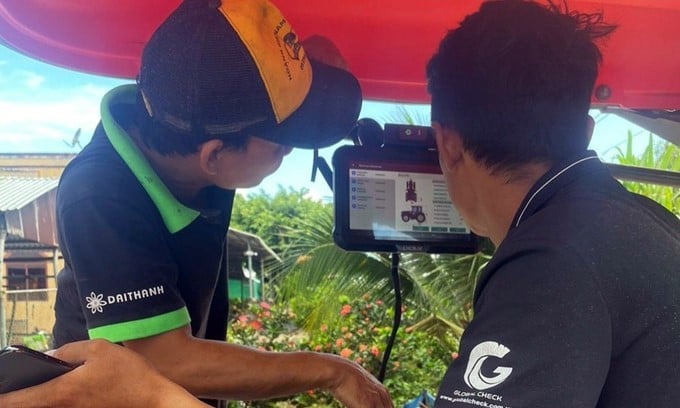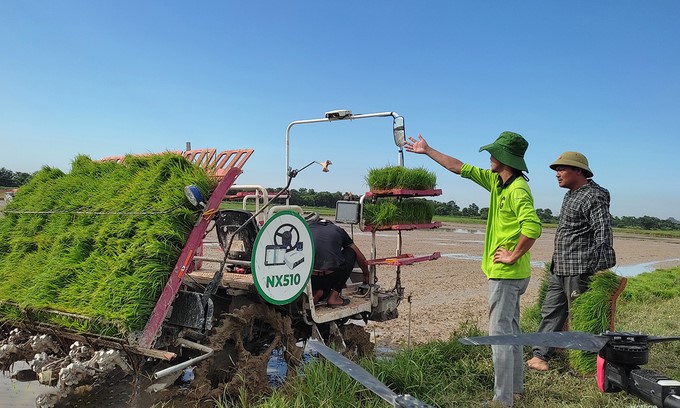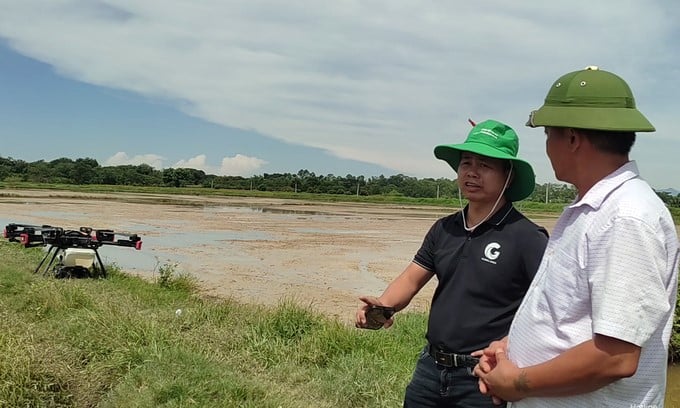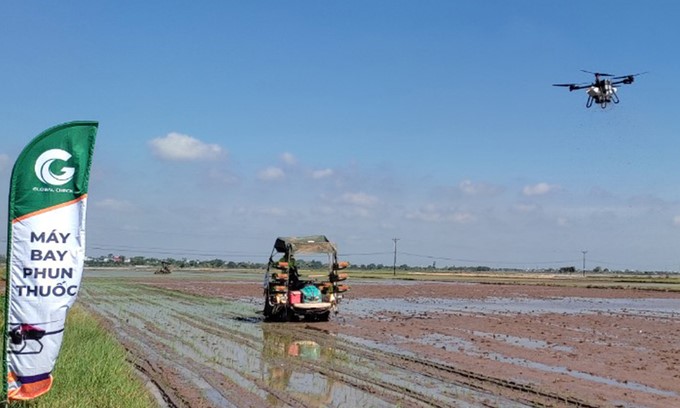May 29, 2025 | 15:58 GMT +7
May 29, 2025 | 15:58 GMT +7
Hotline: 0913.378.918
May 29, 2025 | 15:58 GMT +7
Hotline: 0913.378.918

The technical staff of Dai Thanh Company instructs people to use navigation device.
Discussing rice production towards green agriculture, reducing emissions, and enhancing field mechanization and modernization, Mr. Nguyen Duc Truong, COB and General Director of Dai Thanh Joint Stock Company, shared with Vietnam Agriculture Newspaper issues related to this content.
After a period of working hard in the agricultural field, Mr. Nguyen Duc Truong realized Vietnamese farmers’ miserableness and set himself the goal of "accelerating" agriculture. In 2004, Dai Thanh Joint Stock Company was established, which is like the first brick for this journey.
Based on the common goal of aiming for green production and field mechanization, Dai Thanh Company focuses on two main fields: hybrid rice seeds and smart technology in agricultural production. The company starts with high-quality hybrid rice seeds, such as GS9, GS55, and GS999, which bring great benefits to farmers nationwide. In particular, in difficult lands in some Northern mountainous provinces, heterosis has been shown to suit regional characteristics such as short days, strong tillering, good cold, drought, pest resistance, and yield superior to conventional rice varieties.
Along with that, there are advanced technological solutions to improve the performance and productivity as well as the quality of agricultural products in agricultural production. With the motto "Innovation and Sustainability", the company uses smart, modern equipment such as agricultural aircraft (drones), navigation devices, and ground agricultural machines.
“Especially, we focus our resources on researching Continuously Operating Reference Station (CORS) solutions. This is a global measurement system based on GPS (Global Positioning System) to provide accurate geographical location and elevation information for geographical applications,” said COB Nguyen Duc Truong.
CORS is often used in the fields of measuring, geology, geography, and construction. In agriculture, CORS provides accurate reference points over a wide area. Thanks to that, users can use measuring and positioning devices to perform tasks such as measuring field area, locating boundaries, determining elevation, measuring rainfall, temperature, and other parameters related to agricultural production.

The NX510 navigation device combined with a seedling transplanter helps reduce labor power for people.
Unlike some other subjects, Vietnamese farmers have a tradition of production based on experience, looking at the sky, land, and clouds. That is ingrained in their way of thinking and doing, so convincing them to use a new product is not easy. They also do not dare take the risk of replacing current production methods.
Understanding this, during the first time of implementing digital transformation in 2016, Dai Thanh Company prioritized the goal of attracting people's attention. One good thing is that although people are hesitant about new things, the sense of community and spread are very high. People may not believe what Dai Thanh says, but they will listen to their neighbors, family members, or friends. Therefore, Dai Thanh Company advocates expanding the market slowly but surely so that where they come, they can convince people. Everyone will finally care as long as products are really good for people.
"I remember the first days of drone demonstrations the most. Because it was the first unit to introduce drones as a breakthrough solution in agricultural cultivation, helping to optimize crop care and management, Dai Thanh Company had to "go every alley, knock door to door" to invite people to the field to see with their own eyes the drone spraying fertilizer automatically, sowing seeds accurately, and spraying pesticides at the right dosage. Through setting parameters and advance directives, drones help significantly reduce the consumption of resources such as water, pesticides, and labor," said Mr. Nguyen Duc Truong.
Now, Dai Thanh Company has formed an entire ecosystem of agricultural machines. We are planning to replicate the digital farm model throughout the country. Currently, the company is testing relatively successfully in Bac Ninh, Bac Giang, Long An, Hau Giang, Kien Giang, Dong Thap, and Soc Trang.
Not stopping there, the company also plans to deploy agricultural monitoring stations. Basically, these stations will connect to each other in terms of data and band in areas of need. After that, all of Dai Thanh's equipment will use this same source and increase operating capacity to the maximum. For example, a conventional drone has a flying speed of about 25–30 km/h when spraying, and it takes 8–10 minutes to complete the spraying task on an area of 1 hectare. But if there are monitoring stations and suitable terrain, the flight speed can be doubled. It takes people less than 5 minutes to complete the field.

Mr. Nguyen Duc Truong, COB and General Director of Dai Thanh Joint Stock Company.
Positioning navigation devices for ground agricultural machines also greatly benefit from these stations. Dai Thanh Company has deployed specialized navigation equipment (NX510). Thanks to GPS and sensor technology, these devices help determine the exact position of the machinery, adjust the depth and route, and ensure that spraying, seeding, and tillage are carried out efficiently and consistently. If more data is available, this device is capable of more precise navigation for agricultural machines, especially in complex, sloping terrain. It also helps farmers remotely manage and monitor agricultural equipment via an Internet connection or wireless technology.
In this era of 4.0 technology, perhaps speeding up is not enough. The machinery system of Dai Thanh in particular and the whole country in general must be ready to get the agriculture sector on the highway. There, farmers can sit at home and still monitor all the growth of plants, temperature, humidity, pests, etc. in their fields. Everything is operated completely automatically and controlled intelligently by a phone application.
Hopefully, one day, Vietnamese farmers can both participate in the workshop and control the drone in rice cultivation to reduce emissions and help the activities of sowing seeds and spraying fertilizers and pesticides be implemented accurately to the minute. Fruit growers will also stop worrying about how to manage spray flow so that the pesticides are evenly absorbed under the leaves. Or durian growers just need to press the button, and the automatic machine will cut the fruit neatly into the net.

Dai Thanh Company’s demonstration model of drone spraying pesticides and fertilizers.
Increasing agricultural economic value for farmers is a long path, requiring both technical and non-technical factors. New regulations and requirements from major export markets such as the United States, EU, etc. pose challenges but also open up opportunities to change people's thinking and awareness. Now it is necessary to raise the goal from "eating deliciously, dressing beautifully" to "green eating, clean dressing", meaning that whatever we do does not harm the environment and preserves the world for future generations. To do so, it is imperative that people apply more technology and think more about any choice.
Another ambition of COB of Dai Thanh Company Nguyen Duc Truong is that when the company turns 20 years old, if farmers have any good ideas or new problems, please come to Dai Thanh, a leading address for green production in agriculture.
Translated by Huyen Vu Thu
/2025/05/25/4127-3-073637_820.jpg)
(VAN) Thanks to the promotion from an FAO-implemented project, vegetable production in greenhouses in Moc Chau has seen strong development, from 1.5 hectares in 2021 to nearly 50 hectares in 2024.

(VAN) FAO has recently supported USD 140,000 to implement the project 'Risk mitigation human-animal interface risks through disease control initiatives in pig farming.'

(VAN) The People's Committee of Tra Vinh province has approved an adjustment to the investment policy for the Green Hydrogen Plant project, increasing its area to approximately 52.76 hectares.
![Reducing emissions from rice fields: [2] Farmers’ commitment to the soil](https://t.ex-cdn.com/nongnghiepmoitruong.vn/608w/files/news/2025/05/05/dsc08881jpg-nongnghiep-140632.jpg)
(VAN) Clean rice cultivation model in Thuong Tan commune, Bac Tan Uyen district, is assisting local residents in achieving sustainable agriculture by substantially reducing costs, increasing productivity, and protecting the environment.

(VAN) At the conference to disseminate Resolution No. 68, AgriS introduced its digital agricultural ecosystem and reaffirmed its commitment to accompanying the Government in promoting private sector development and sustainable agriculture.

(VAN) 'Blue Ocean - Blue Foods' initiative is designed to restore marine ecosystems and establish sustainable livelihoods for local communities by cultivating a minimum of 1,000 hectares of cottonii seaweed in the first three years.
/2025/05/21/4642-3-112707_603.jpg)
(VAN) The V-SCOPE project has made direct contributions to three out of six pillars of the Comprehensive Strategic Partnership between Vietnam and Australia.